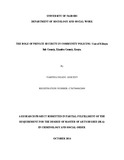| dc.description.abstract | The primary duty of every legitimate state is security and safety of her citizens and all persons
within their jurisdiction. Rise of insecurity has led to more and more people turning to the
private security to ensure their personal safety and that of their families and property. This
demand arises due to the inability of the state to provide adequate security to its people.
Simonsen (1998) noted, there should be partnerships between the public and private sector
institutions that provide many of the same services. This study sought to identify the role played
by the private security in community policing.
The study aimed at determining the level of engagement of private security in community
policing, finding out the capacity of private security in supporting the implementation of
community policing and to establish the relationship between the private security officers and the
police. It was grounded on the differential association theory and the social control theory and
adopted a descriptive research design. The primary target population constituted both male and
female private security officers drawn from different private security companies in Kikuyu Sub-
County. The unit of analysis of this study was the role played by the private security in
community policing and the unit of observation was the private security officers. Purposive
sampling and simple random sampling was utilized in selecting a sample size of 120 officers
drawn from the management teams, field supervisors and the security guards. The study used
primary data collected from the private security providers. Questionnaires and interview guides
were used to collect data. The data obtained from the questionnaires was edited, coded and
entered in the computer for analysis with aid of statistical software (SPSS v20). The study used
descriptive analytical methods which included percentages tables, graphs and charts to enhance
clarity.
The study identified various services offered by private security sector in Kenya which included:
cash carrying, guarding, alarm response and executive protection and security consulting. The
study noted that there is no standardized form of training among the private security officers a
factor which has an effect on their recognition as credible partners in community policing. The
respondents rated the private security providers to be more advantaged than the police officers in
access to information on crime due to their greater public confidence, their static deployment as
well as their greater numbers in deployment compared to the police. They further noted that the
level of cooperation and the level of information sharing between the private security providers
and the police in fighting crime to be low. In community policing, the respondents perceived the
level of engagement in it to be low due to low level of mutual mistrust and rivalry that exists
between the two entities. The respondents identified several synergies between police and the
private security providers in areas where joint operations are carried out. They were however of
the opinion that the level of cooperation may be enhanced through joint training, regular joint
security briefing meetings and crime mapping, physical and information resource sharing as well
as reduced suspicion between the two entities. On the possible improvements on the policy and
regulatory frameworks governing the practice of private security providers, the respondents
recommended establishment of participatory regulatory bodies, enactment of Private Security
Bill as well as training on how to deal with the emerging types of crime such as terrorism and
cybercrimes. This will increase the participation of the private security providers in community policing | en_US |

